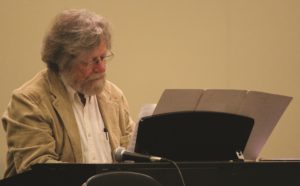A Choral Storm in Cincinnati
Some Reflections on the Seventh Edition of the World Choir Games
Aurelio Porfiri, choral conductor and teacher
Between July 4 and 14, 2012, the ‘great city of Cincinnati’ (as the Americans like to call it) was taken by storm by around 15,000 singers coming from 64 countries and belonging to 362 choirs to participate in the 7th iteration of the World Choir Games. This was an important event, because it was the first time they were held in North America, a country with an important tradition in choral music.

This event was certainly a success in many regards. It is necessary to observe the huge efforts of the city of Cincinnati. I really had the impression that the entire city was involved in the organization of this big event: advertisements for the games were everywhere. A considerable number of volunteers assisted choirs and other participants in every possible way and also the normal population of the city was ready to give directions and assist visitors. All the venues for the competitions were within walking distance and, special for the World Choir Games, most of the competition venues were sold out. The Economic Center for Education and Research at the University of Cincinnati, in a study released in 2010, affirmed that the economic impact of the WCG on the city of Cincinnati would be considerable, over 70 million US dollars. This is perhaps why INTERKULTUR, which created and has organized the World Choir Games from the start, decided to set up a permanent office in this city. It will promote other events related to choral music in the future. Certainly the vast number of singers and the efforts of Cincinnati were commendable, but there is more to say about this iteration. We have had, for example, more than 40 workshops with lecturers coming from all over the world talking about topics related to the world of choral music in its widest context. And we have witnessed special events and friendship concerts.

From an artistic point of view it was an interesting event. The choirs compete in two different ‘branches’ of the WCG: the ‘Open Competition’ and the ‘Champions Competition’. The first is open to all choirs, and the second to choirs that were already winners of other INTERKULTUR events or that had shown some level of special achievement. In the ‘Open Competition’ there were outstanding choirs which maybe did not feel yet ready to compete in the more challenging ‘Champions Competition’ but that showed an advanced artistic and technical level. The leader of the medals table was the USA, with 76, followed by China (including Hong Kong) and Indonesia. Then came Russia and South Africa. But this ranking does not tell the whole story, as the USA achieved most in categories traditionally associated with the country: gospel, spirituals, show choirs and barbershop. At a deeper level we note advancement in choirs coming from China, ranking second after the USA, but taking more gold medals (30:23). Recalling the WCG in Xiamen in 2006 and the level of the Chinese choirs at that time, they are progressing extremely fast, with some performing at very high level and offering programmes that reflect a more international taste than in the past. Interesting too is Indonesia, in third place – a country with a vibrant choral life and which is demonstrating the fruits of its labor. South Africa is a growing force too, some choirs demonstrating an amazing technical level.

After such a large event, the choral world will note that INTERKULTUR remains an important force in the world of contemporary choral music, and it will surely capitalize on this recent successful experience, continuing to interact with other forces in the world of choral music and to develop, internally and externally. The 8th iteration of the WCG will be held in Riga in 2014. On that occasion we will see if trends observed in this WCG will continue or if new forces will come forward to shape the future of choral music. New champions are certainly waiting.
Revised by Caterina Leucci, Australia & Gillian Forlivesi Heywood, Italy